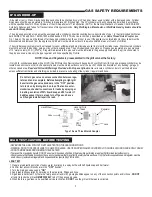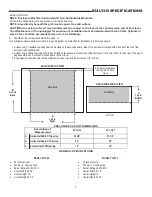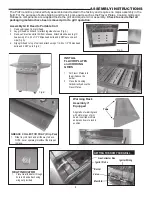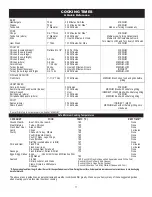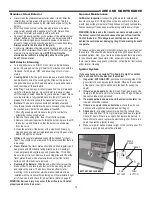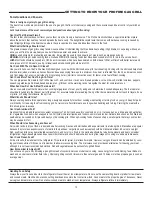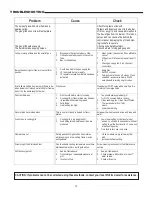
GETTING TO KNOW YOUR PROFIRE GAS GRILL
Some Questions and Answers.
There is really no mystery to gas grill cooking.
The best of two worlds are combined in the use of a gas grill, the flavor of charcoal cooking and the convenience and heat control of your kitchen
oven.
Let’s look at some of the most commonly asked questions about gas grill cooking:
Can I Get That Charcoal Flavor?
The fact is that charcoal does not flavor your outdoor meal, but is only a heat source. The ProFire Gas Grill utilizes a special metal flavor plate
above the burners that heats up fast and spreads the heat evenly. The delightful backyard taste that comes with barbecue cooking is caused by
meat drippings falling on the heat source where they are vaporized to rise and add outdoor flavor to the food.
What Control Settings Should I Use?
The greatest cause of gas grill cooking failures is excess heat. Understanding the three basic heat setting (High, Medium, Low) along with experi-
ence, you will find the precise heat you need will become easier and easier to achieve.
HIGH-
Is used primarily for preheating and cleaning. It may also be used for quick searing of meats, such as steaks and chops.
MEDIUM-
For broiling or quick cooking foods. Also use MEDIUM for searing foods that have been cooked at LOW, for more of a smoke flavor.
LOW-
Most foods should be cooked at LOW. Even thick steaks, which have been seared on both sides at HIGH, will finish with better texture and
more juices at LOW. All roasts, poultry, rotisserie and smoke cooking should be at LOW.
Do I Cook With The Lid Open Or Closed?
Like your kitchen oven, the ProFire Gas Grill is designed to cook with the lid closed, except for quick searing. Cooking with the lid closed helps food
retain natural juices, moisture, enhances flavor and keeps annoying flare-ups to a minimum. Also, heat is reflected from the lid, and meat cooks not
only from below, but, evenly on all sides from circulating hot air, (similar to convection oven) for faster, more fuel efficient cooking
Can I Cook More Than One Thing At A Time?
You can prepare entire meals in the ProFire Gas Grill…and you’ll love it even more. Baked potatoes, corn
-on-the-cob, stuffed tomatoes, peppers,
squash, vegetables, garlic bread, baked apples, pies...grill them on the warming rack or alongside the meat for complete menus.
When And How Do I Use A Meat Thermometer?
Use an oven-safe meat thermometer when cooking large pieces of meat, poultry and game to determine if cooked adequately. The thermometer
should be inserted into the thickest part of the meat. For accurate temperature reading, the tip of the thermometer should not touch fat layers, bone
or gristle, or if using the rotisserie, the spit rod.
What Utensils Should I Use?
Always use long handle forks, spatulas or tongs, designed especially for outdoor cooking when testing or turning food on your grill. Keep hot pads
or mitt handy for removing food from cooking grid. For juicy more flavorful meats, use tongs when handling and turning. Piercing the meat with a
fork allows juices to escape.
Can I Use Aluminum Foil?
Aluminum foil is probably the most convenient accessory of all. Foil can be used to cook food on or in. It also serves as a drip pan and heat deflec-
tor. Vegetables cook best when wrapped in foil. Foil holds in natural liquids, and foods cook moist and tender. Delicate foods such as fish fillets and
seafood may be cooked on foil placed directly on the cooking grid. When spit-cooking foods of uneven shape, smaller parts that may cook too fast,
may be wrapped in foil.
When Should I Use Seasoning and Sauces?
Salt, which tends to dry out foods, is best added after cooking. Sauces and marinades add a special taste treat when grilled. Marinades are popular
because they turn less expensive cuts of meat into tasty entrees. Large items such as roasts should be marinated at least 8 hours or overnight.
Fish, poultry and ribs may be marinated successfully in an hour or two. Food in the marinade should be turned occasionally and kept cool under
refrigeration. Sugar-based glazes and sauces will burn faster and should be brushed on during final stages of cooking or used as a table sauce.
Can I Cook Frozen Food?
For best results, thaw all meat in the refrigerator. This allows for juicier, more flavorful meats. However, very good results can be obtained by cook-
ing your steaks while still frozen. Just remember to allow more cooking time. The microwave oven provides an alternative for thawing your meat,
although it is our least recommended method. Fish and vegetables can be successfully grilled frozen.
How Economical Is A Gas Grill?
You will save on your utility bill using a gas grill instead of conventional oven or charcoal cooking. Less energy for air-conditioning, fewer dishes to
wash and no charcoal or starter fluid to buy. Charcoal grilling costs 30 times more than natural gas and 10 times more than propane gas to cook an
average meal.
Handling Food Safely
Always thaw your frozen products in the refrigerator. Never thaw at room temperature. Do not use the same cutting board or platter for raw meats
and cooked meats. Wash hands, utensils, cutting boards and counters that contact raw food. Cook meats to the proper degree of doneness; Never
serve ground meats rare or raw. Do not allow cooked meats to stand at room temperature. Always refrigerate leftovers immediately.
13





